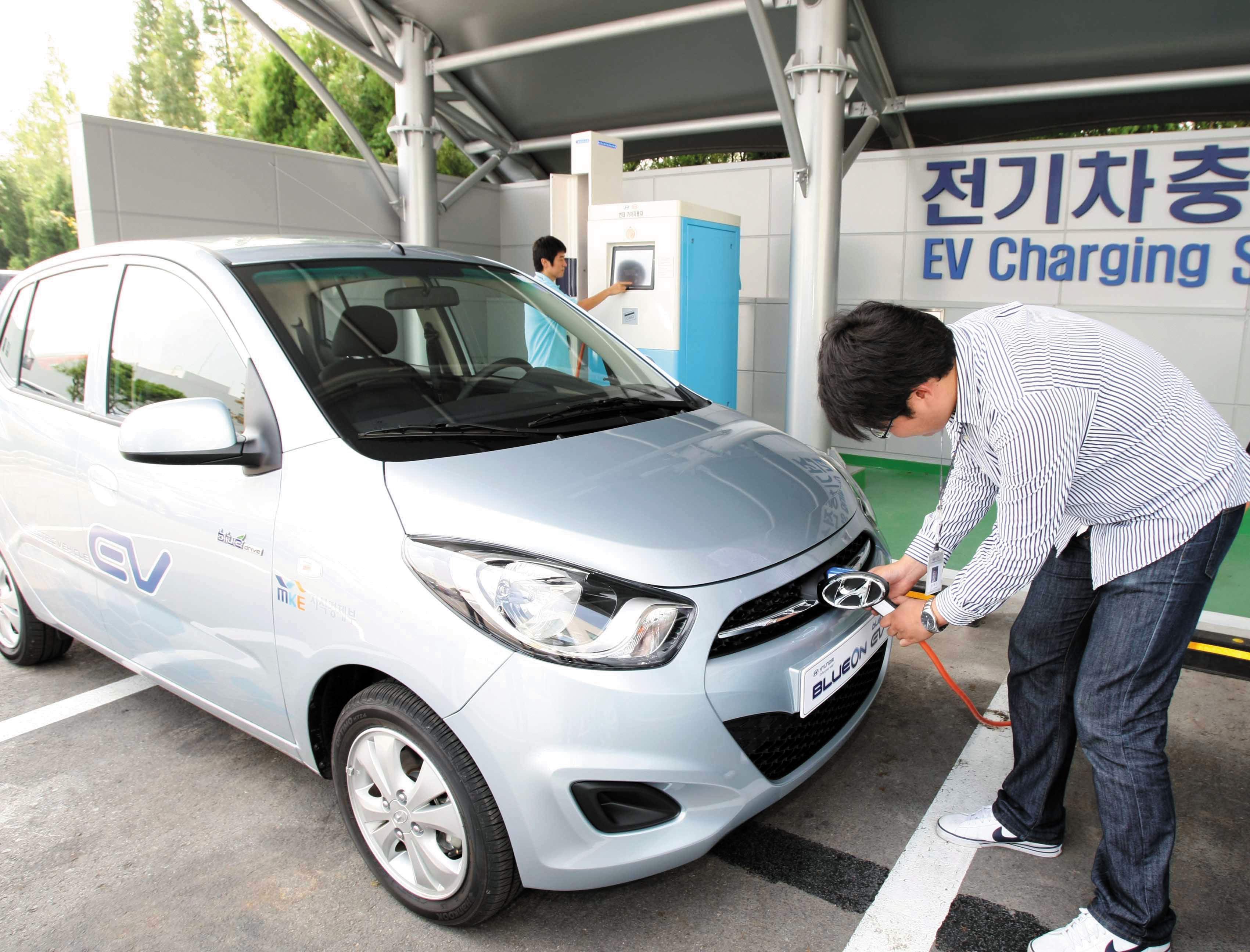Korea Sets In Motion Mass Production of EVs in 2014
Government and private sector plan to pour 100 mln won into advancing the mass production of small-sized EVs by 2014


The government announced a plan to mass-produce small-sized electric vehicles starting in 2014 in cooperation with the private sector.
The Ministry of Knowledge Economy (MKE) decided to advance the mass production of small-sized electric vehicles by three years to get a jumpstart in the global electric vehicle market, Director Joo Young-joon of the MKE's Automobile & Shipbuilding Division said. Originally, the MKE established a plan calling for mass-producing electric vehicles starting in 2017.
The government and the private sector will jointly invest 100 billion won to advance the mass production of small-sized electric vehicles ¡ª 70 billion won from government coffers and the remaining 30 billion from the private sector.
The MKE selected a consortium led by Hyundai Motor Co. as the winner of the small-sized EV development project. The winning consortium consists of 44 organizations, including large and small-sized companies, research institutes and universities. The consortia who participated in the bidding for the project were headed by GM Korea, Renault-Samsung Motors and Ssangyong Motor.
The Hyundai-Kia Automotive Group has already produced its first, small-sized electric vehicle, BlueOn, starting last year after building electric vehicle production infrastructure. It also plans to build a new light crossover utility vehicle (CUV) EV production line. The group aims at producing 250 vehicles to be supplied to public organizations for this year while planning to launch the production of the light CUV electric vehicle in late 2011 with the goal of producing 2,000 units in 2012.
The project calls for focusing on lowering prices for EVs by enhancing the functionality of the top five key automotive parts of EVs, including motors, air-conditioning units, batteries and chargers. If the project is implemented successfully, Korea will be able to produce EVs with higher performances than Nissan's Leaf and others. Currently, the Leaf has strong points such as 160 km traveled on each charge, compared to 140 km for BlueOn.
With crude oil price hikes and environmental issues looming large, the government's announcement of the project is expected to gain the momentum needed for invigorating the electric vehicle market, industry analysts said.
The reality is that the price of EVS is five times higher than that of gasoline cars due to the weak competitiveness of key automotive parts of EVs, and the project is designed to rev up the competitiveness of key automotive parts of EVs, MKE officials said.
Regulations stipulate that even automotive parts makers will be given proprietary rights to technologies to be developed for the project, they said.
In addition to the Hyundai-Kia Automotive Group, Renault Samsung Motors has unveiled plans to produce 100 electric vehicles based on its smaller SM3 models with the goal of expanding production to 13,000 units by 2015. GM Korea plans to make massive investments into the production of three electric vehicle models. Ssangyong Motor is also making massive investments into the development of electric SUV models.
But experts agree that such problems plaguing the EV segment as tax benefits, charging infrastructure and standardization should be fixed in advance on top of prices and improved functionality in a bid to invigorate the EV industry. They share the view that the Korean government should come up with steps to provide diverse tax benefits and subsidies to customers, as advanced countries such as the United States and Japan do. The government should actively address detailed plans and standardization to expand infrastructure for charging EV batteries.
Prof. Hur Hoon of the Korea Advanced Institute of Science and Technology (KAIST), serving as a coordinator for setting national standards in the EV segment, recently told an event that the standardizing of EVs, charging systems and batteries are preconditions for mass-producing EVs and EV-related infrastructure standards will influence the competitiveness and confidence of the EV market. nw
(left) The Hyundai-Kia Automotive Group's electric vehicle, Blue-on has hit the streets in Seoul. Korea needs to have sufficient EV infrastructure, including charging stations (seen at right). A consortium, headed by Hyundai Motor, has been selected as the winner of the small-size EV development project, initiated by the government.
Photo on Courtesy of Hyundai Motor
3Fl, 292-47, Shindang 6-dong, Chung-gu, Seoul, Korea 100-456
Tel : 82-2-2235-6114 / Fax : 82-2-2235-0799